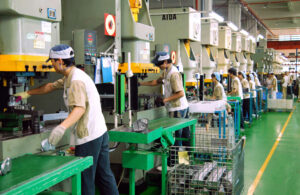>>REAL-TIME UPDATES IN THE WIRE. CLICK HERE<<<
China’s factory activities contracted at the fastest pace in two years in March due to the impacts of the latest COVID-19 outbreaks, a private survey showed on Friday.
The Caixin/Markit Manufacturing Purchasing Managers’ Index (PMI) declined to 48.1 last month, marking the lowest level and the fastest contraction since February 2020, compared to 50.4 in the previous month. The 50 point mark separates growth from contraction on a monthly basis.
That reading was largely in line with the official PMI figures released on Thursday, which showed the country’s manufacturing and services activities simultaneously slipped into contraction for the first time since March 2020, with factory activities shrinking at the fastest rate since October 2021.
The private-sector Caixin survey focuses more on small firms in coastal regions and private companies, while the official survey mainly tracks large-sized companies, mostly state-owned enterprises (SOEs).
Due to the impacts of Covid-19 outbreaks, the manufacturing sector’s supply and demand both contracted, overseas demand waning, employment remained largely stable, inflationary pressure climbed and market sentiments weakened, according to the Caixin survey.
In breakdown, the sub-indexes for production and new orders both slipped into contractions and both hit the lowest levels since March 2020.
The sub-index of export orders also fell below 50 mark to hit the lowest level in 22 months, as surveyed companies said the latest virus outbreaks in China, disruptions in shipping sector and greater market uncertainties from the Ukraine crisis led customers to cancel or suspend orders.
The gauges for purchasing prices of raw materials and their products’ factory-gate price both climbed for the third consecutive month to hit the highest levels since November 2021, with material prices growing faster than product prices, indicating rising inflationary pressure.
The sub-index for raw material inventories slipped deeper into contractions in March, while the gauge for product inventory improved, although remaining in the contractionary territory. A number of factories attributing higher prices to tight global supply chains, which was exacerbated by the war in Ukraine.
The sub-index for manufacturers’ business expectations ended a months’ recovery and weakened in March, although it managed to stay in the expansionary territory.
One bright spot was the sub-index for employment which climbed into expansion for the first time since August 2021, showed the survey, as factories ramped up hiring after the Lunar New Year holiday.
The world’s second-largest economy, which picked up pace in the first two months of year, is now at risk of slowing sharply as authorities restrict production and mobility in COVID-hit cities, including major economic centres like Shanghai and Shenzhen.
Government officials have vowed to roll out policies to stabilise the economy as downward economic pressure builds, a cabinet meeting said on Wednesday.
The possibility of the People’s Bank of China cutting reserve requirement ratios in April has risen as economic headwinds intensified, according to a state-run China Daily report, citing experts.
“The prospect of the war between Russia and Ukraine is uncertain, and the commodity market convulsed,” said Wang Zhe, Senior Economist at Caixin Insight Group, in a statement accompanying the data release.
“A variety of factors resonate, aggravating the downward pressure on China’s economy and underscoring the risk of stagflation.”

